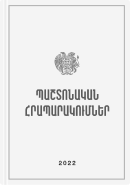Information
Act Info
Changes and incorporations
Relations
AMENDMENTS TO AND IMPLEMENTATION OF THE 1968 CONVENTIONS ON ROAD TRAFFIC AND ON ROAD SIGNS AND SIGNALS AND THE 1971 EUROPEAN AGREEMENTS SUPPLEMENTING THEM
Type
Agreement
Act type
Base act (-till now)
Status
Active
Source
OBMOFA RA 2014.12.24/4(30)
Enactment organisation
Republic of Armenia
Main act
,
Change history
Changed acts
Changing act
Incorporation
Has made changes in following acts
Corresponding incorporation for each change
Synchronous scrolling

General relations
Judicial Precedents
Official clarifications
Anti-constitutional



